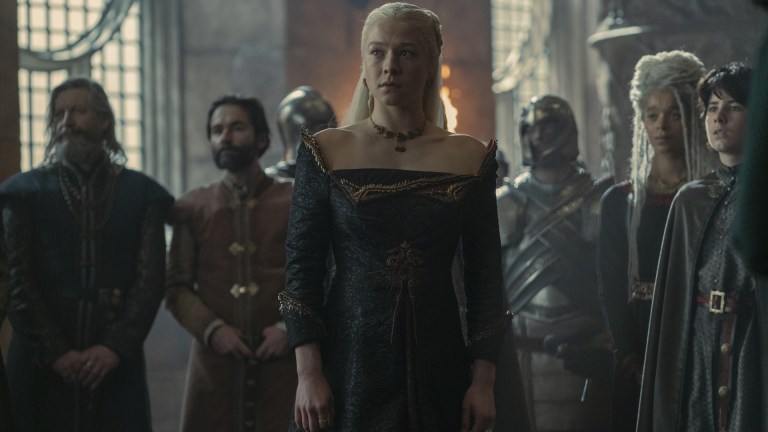House of the Dragon Is a Cruel Reminder We Still Don’t Have a Great Game of Thrones Game
House of the Dragon's incredible second season serves as a cruel reminder that we're still no closer to a truly great Game of Thrones game.

It really is the era of high fantasy. Publishers are seeing an increase in sales, the genre is back on the agenda on the big screen and television is being dominated by adaptations and new interpretations of the genre. Driving that initial wave of interest was Game of Thrones, the highly-regarded show inspired by George R.R. Martin’s A Song of Ice and Fire saga and based on the Fire & Blood fictional history book. Following in the footsteps of juggernauts like The Lord of the Rings before it, the Westeros saga became a massive franchise that eventually led to further novels and new spinoffs in development. Among them was House of the Dragon which recaptured the audience’s interest in the brand after Game of Thrones finished with a dissatisfactory finale.
The assumption was, that just as Middle-earth was brought to life in a wide array of gorgeously-designed video games, so too would the Seven Kingdoms be realized in a digital format. Alas, the return to Westeros in House of the Dragon has only reminded viewers that this player-centric revolution is still yet to take place. Game of Thrones, House of the Dragon, and George R.R. Martin’s published works are perfect stories to tell in this action-focused medium, but HBO has yet to pull the trigger on the franchise’s full potential.
Game Of Thrones Has A Short History Of Video Game Releases
There have been some attempts at A Song of Ice Fire (primarily, Game of Thrones) games over the years. As of this writing, 13 different games inspired by the intellectual property have been developed. Of that number, 10 were optimized for mobile play, even if they were available on other platforms. Online strategy games like Game of Thrones: Winter is Coming (2019), idle titles like Game of Thrones: Tale of Crows (2020), and building experiences like Game of Thrones Conquest (2017) indicate that the franchise has great range and versatility, but none of these outings made full use of what George R.R. Martin and HBO have built. Two of the games not mentioned – the misjudged strategy title A Game of Thrones: Genesis (2011) and the poorly executed action-RPG Game of Thrones (2012) – also failed to live up to expectations.
The only standout in this run has to be Telltale’s take on the series, which played to the strengths of the episodic graphic novel developer. Having worked with big brands like Batman, The Walking Dead, and Guardians of the Galaxy, Game of Thrones: A Telltale Adventure (2014) does not look out of place among that prestigious run. It got the storytelling right and understood what the audience loved about the property. Unfortunately, the planned season 2 was canceled after the studio experienced significant financial trouble. Ultimately, the Telltale title came close demonstrating what a true Game of Thrones video game can bring to the table, highlighting why the franchise is so ready for something bigger.
Westeros Is Prime For An Adaptation
It’s a bold claim to suggest that any franchise is well-suited to adaptation in a completely different medium. However, the words could not be more true for Game of Thrones and House of the Dragon.
Ignoring the high fantasy elements for a moment, the shows have become such a great vehicle for compelling characters, bloodthirsty action, and genuine political nuance. That is why it’s a genuine surprise that while there has been a push to transfer those key components to some kind of video game project (albeit largely on mobile), none of those attempts have truly worked.
A Song of Ice and Fire has developed a wide-ranging and ever-growing fan base that is engaged by those emotional arcs and intelligently written relationships. Take a character like Jaime Lannister for instance. Seemingly irredeemable, the figure somehow became a favorite thanks to his long-term development and the catalyst of Brienne of Tarth placing him in slightly a more morally secure position. A dynamic like that would play beautifully within the context of an evolving, choice-based video game narrative
Yet, A Song of Ice and Fire also excels at incorporating those character moments into massive setpiece moments. A scenario like the Battle at Hardhome, which is full of harrowing setpieces and horror-infused mayhem, indicates that a series that has such deeply nuanced character arcs, can also be contrasted massively in genre with well-choreographed action sequences that players would want to experience for themselves.
There’s a massive crossover between the video game and Game of Thrones community, and Martin’s pre-existing audience ensures that there’s already a financial incentive to develop an interactive experience that advances the strengths of the franchise. Whether it’s the dragons and White Walkers or mysterious magic, video game developers would have a superb set of tools at their disposal to deliver something exciting to the fan base.
There Are Plenty Of Examples That Highlight The Franchise’s Strengths
What’s perhaps most frustrating is that there are so many games out there that exhibit many of the elements you would expect to see in a great Game of Thrones video game. Many major titles boast the kind of mechanics, storytelling moments, and fantastical elements that A Song of Ice and Fire would benefit from.
The Witcher is an obvious comparison, considering the fantasy epic was originally adapted from a novel series and has since ballooned into a much wider-ranging franchise. The grittiness of The Witcher games (coupled with its intense character dynamics, epic storytelling, and accessible mechanics) have made them a clear prototype of what fans want from a Game of Thrones adaptation. The efforts of developer CD Projekt RED and the originality it took to take the concepts from the page and effortlessly realize them in a new medium, highlights the need for the right development partner.
Elden Ring offers an alternate example of what fans wish to see in a proper Westeros gaming adventure. George R.R. Martin’s contributions to that game’s narrative development offer it a world rich with backstory and full of interesting mythos to explore. How this original landscape has been so brilliantly realized is a credit to the team at FromSoftware Inc. who understood how to connect with audiences in such a heightened reality.
The list of games that offer a potentially ideal Song of Ice and Fire experience minus the actual license hardly stops there. Whether it is the Skyrim saga, Final Fantasy, Crusader Kings, or Dragon Age, the list of comparable titles is exhaustive and suggests that correctly conveying the tone and action needed to adapt Game of Thrones to the video game industry isn’t as challenging as it has been so far. Any title that takes the dark and dangerous feel of George R.R. Martin’s work and combines it with mechanics that accentuate those niche fantasy components, is likely a more worthwhile gaming experience than those officially licensed titles that came before.
What Does A Dream Game Of Thrones Title Look Like?
So with all the advantages of the Game of Thrones franchise, coupled with familiar elements surfacing within other fantasy titles, the question that has to be asked is what would make a genuinely good Game of Thrones or House of the Dragon game?
Well, fans are looking for a console-based experience, with superior graphics and an open-world, single-player narrative that puts the focus on character and the exploration of Westeros. Although it might be viable to replay the events of the series or novels, what would be more appealing is to give players their own narrative and customizable characters whose gameplay decisions impact the storyline without straying too far from the overall lore of the universe.
Titles like Red Dead Redemption 2 and Ghost of Tsushima exhibit the production qualities HBO should be aiming to replicate in a Westeros-based title. The cinematic quality of those releases, coupled with their RPG elements, make them the Triple-A ceiling for such a game. Players would also love to be in charge of their own house or be placed in the action as an independent agent so that they have to negotiate their way through the politics of the region. The end goal? The Iron Throne of course, with the game building towards a confrontation for the crown, and players hoping to wear it themselves.
With fantasy elements to weave in, like adventures beyond The Wall, the first game in the series should put the focus on those elements that made the series popular to begin with. The mechanics could incorporate the wide skill sets seen in the franchise, taking inspiration from the stealth of the Faceless Men, the fighting abilities of the great Knights of olde, and the horseriding talent of the Dothraki. And naturally, there have to be dragons.
House Of The Dragon May Prompt New Developments
House of the Dragon has ultimately served as a cruel reminder that there currently aren’t any proper Game of Thrones titles on the market that can fully immerse players in the famous fictional backdrop. So while there’s all the potential in the world for such a title to be a success, and the hope that future developments may lead to new breakthroughs in HBO’s plans, right now, fans are left to find similar games that convey some of the same themes as George R.R. Martin’s most well-known saga.
With a mobile MMORPG named Game of Thrones in the works over at Netmarble, and Zynga producing Game of Thrones: Legends a puzzle-driven RPG, the wait for a current generation, AAA, action-adventure title set in Westeros might go on a little longer. Players came close when studios Bigpoint and Artplant were commissioned to bring an MMORPG to life, but Game of Thrones: Seven Kingdoms was canceled before it really got going and was instead transformed into Game of Thrones: Winter Is Coming, leading to another missed opportunity.
House of the Dragon serves as a reminder that things can change. It’s a signpost for the resiliency of a franchise that just keeps coming back. Considering how the initial run of Game of Thrones ended, you’d be forgiven for thinking that House of the Dragon would have been a flop; a spinoff driven by HBO’s need for franchise longevity met with apathy for a conclusion turned sour. Yet, Westeros is as popular as ever, with quality decision-making leading audiences back to the world they loved so much. If the live-action interpretation of the Song of Ice and Fire brand can overcome such adversity and somehow come out stronger, then why can’t the video game division do the same?
Ultimately, HBO and Warner Bros. need to look into this question of video game development and take inspiration from those other high-fantasy stories that have cornered the market already. For their own interests, there’s surely financial security in that mission. But for fans who want to create a character, fight for the throne, entrench themselves in a faction, and survive the beasts beyond the wall, there’s a greater incentive to encourage studios to really push for the rights to this fantasy franchise that holds so much promise.

